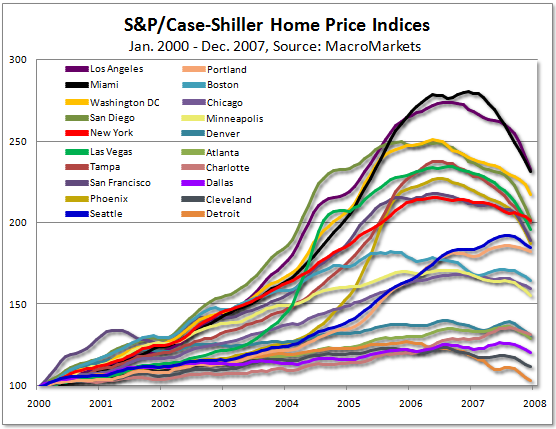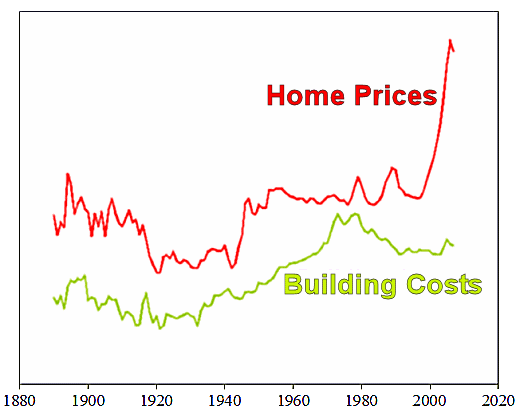[Okay, I admit it. I hate debates. All I do is worry that my person will screw up and the other one won’t. So I’m passing the time until it’s history – then I can watch it. Somehow, it’s the ‘real time’ thing that really gets to me.]
This is my adaptation of economist
Robert Shiller‘s data [from his book,
Irrational Exuberance]. I haven’t read the book, but I think I’m going to get it. I’ve never read a book about economics and the Stock Market, but this one deserves all of our attention. Here are a few words from the reviews on Amazon.com:
By history’s yardstick, Shiller believes this market is grossly overvalued, and the factors that have conspired to create and amplify this event–the baby-boom effect, the public infatuation with the Internet, and media interest–will most certainly abate. He fears that too many individuals and institutions have come to view stocks as their only investment vehicle, and that investors should consider looking beyond stocks as a way to diversify and hedge against the inevitable downturn. This is a serious and well-researched book that should read like a Stephen King novel to anyone who has staked his or her future on the market’s continued success
Taking his book’s title and thesis from Alan Greenspan’s 1996 description of investors, Shiller (economics, Yale Univ.) studies the current booming U.S. stock market in historical terms. His research into past U.S. and international markets indicates that during every speculative bubble there was always widespread consensus that high valuations were justified by each market’s special circumstances. Every large market correction seemed to result from popular consensus rather than specific events or news. Shiller says that past bull and bear markets, though often based initially on sound fundamental reasoning, fed upon themselves to go beyond what the facts justified. He challenges the efficient market theory, demonstrating that markets cannot be explained historically by the movement of company earnings or dividends. He concludes that the current U.S. stock market is a speculative bubble awaiting correction. While the book certainly belongs in all academic business collections, public libraries should also purchase it as a counterweight to the plethora of get-rich-quick investment guides.
Shiller studies "bubbles" – overvalued markets – and he’s interested in the "groupthink" that fuels such inflated values. He’s anticipated the bursting of the "housing bubble" for a while now, as well as seeing the whole market headed for a much needed "correction." But more than his stated "herd behavior" approach to things, he’s a solid numbers person – being the co-developer of the
Case-Shiller Index that approximates the cost of housing.
 The graph above from his book tells the frightening tale. At the tail end of the 1990’s, the cost of housing began to climb irrationally. Building costs stayed relatively level, so there was a remarkable increase in the profits coming out of the housing market. As the graphs [also based on Shiller’s data] in my previous post show, the cost of housing relative to income almost doubled during the housing boom – necessitating a different kind of loan. I have no idea whether the availability of these subprime and ballooning loans contributed to the inflated housing costs, or whether the costs lead to the development of the loans, or both, or something else. We all know that the post-Reagan deregulation of Banking and other financial institutions made this kind of radical change in the ease of getting credit possible. But, those important questions aside, Shiller’s focus is on the group dynamics that supported the delusion that the rise in house values would continue, or that these houses really were worth this much.
The graph above from his book tells the frightening tale. At the tail end of the 1990’s, the cost of housing began to climb irrationally. Building costs stayed relatively level, so there was a remarkable increase in the profits coming out of the housing market. As the graphs [also based on Shiller’s data] in my previous post show, the cost of housing relative to income almost doubled during the housing boom – necessitating a different kind of loan. I have no idea whether the availability of these subprime and ballooning loans contributed to the inflated housing costs, or whether the costs lead to the development of the loans, or both, or something else. We all know that the post-Reagan deregulation of Banking and other financial institutions made this kind of radical change in the ease of getting credit possible. But, those important questions aside, Shiller’s focus is on the group dynamics that supported the delusion that the rise in house values would continue, or that these houses really were worth this much.
His book’s title, Irrational Exuberance, comes from a line in one of Alan Greenspan’s speeches in the past. It’s an intriguing way of looking at things. Instead of focusing on the obvious folly that created this mess, Shiller wants to understand it – because it happens over and over throughout history. Why do people come to be so irrationally exuberant and run together off the cliff like the legenday Lemmings? So I guess I’ve talked myself into ordering the book.
There’s an obvious analogy in the life of people who become addicted. We call it denial. The alcoholic doesn’t deny that he’s drinking to excess, or even that too much drinking leads to a bad end. He denies that his drinking has become a necessary component for his life and that he can no longer stop drinking. "I can stop whenever I want to. I just don’t want to. Leave me alone [you prude!]." This crazy "housing bubble" "sub-prime mortgage" crisis feels like the same thing. A whole industry got itself [and us] into very predictable, deep trouble – destroying its own companies – all the while crowing that things were fine. I think they even thought they were fine through most of it.
And like the alcoholic who wakes up in jail having caused a wreck that killed some innocent people, the mortgage brokers that allowed this travesty to reach this catastrophic level are now keeping a low profile or blaming things on other factors. Shiller’s line of thinking does offer us some future hope. He’s trying to quantify and understand how all of this happens. Decrying it is easy. Figuring out how to anticipate [and head it off] it is the more important and productive line of investigation.
And the graphs below show where this crunch is hitting hardest…
 the "bubbles"
the "bubbles"
[There I made it through the debate and ordered me a new book. I understand that Sarah didn’t make any major faux pas, and that Joe Biden did well. That’s all I want to know, really. I’ll watch tomorrow when it no longer matters. Truth be told, this affliction came on watching the 2004 Presidential election returns. In 2006, I went camping on top of a foggy mountaintop on the night of the midterm election.]

 The graph above from his book tells the frightening tale. At the tail end of the 1990’s, the cost of housing began to climb irrationally. Building costs stayed relatively level, so there was a remarkable increase in the profits coming out of the housing market. As the graphs [also based on Shiller’s data] in my previous post show, the cost of housing relative to income almost doubled during the housing boom – necessitating a different kind of loan. I have no idea whether the availability of these subprime and ballooning loans contributed to the inflated housing costs, or whether the costs lead to the development of the loans, or both, or something else. We all know that the post-Reagan deregulation of Banking and other financial institutions made this kind of radical change in the ease of getting credit possible. But, those important questions aside, Shiller’s focus is on the group dynamics that supported the delusion that the rise in house values would continue, or that these houses really were worth this much.
The graph above from his book tells the frightening tale. At the tail end of the 1990’s, the cost of housing began to climb irrationally. Building costs stayed relatively level, so there was a remarkable increase in the profits coming out of the housing market. As the graphs [also based on Shiller’s data] in my previous post show, the cost of housing relative to income almost doubled during the housing boom – necessitating a different kind of loan. I have no idea whether the availability of these subprime and ballooning loans contributed to the inflated housing costs, or whether the costs lead to the development of the loans, or both, or something else. We all know that the post-Reagan deregulation of Banking and other financial institutions made this kind of radical change in the ease of getting credit possible. But, those important questions aside, Shiller’s focus is on the group dynamics that supported the delusion that the rise in house values would continue, or that these houses really were worth this much.
[…] Automobile title loans Creditscore Credit card debt collection Credit scores mortgage « Shiller’s quest… “why am I doing so […]